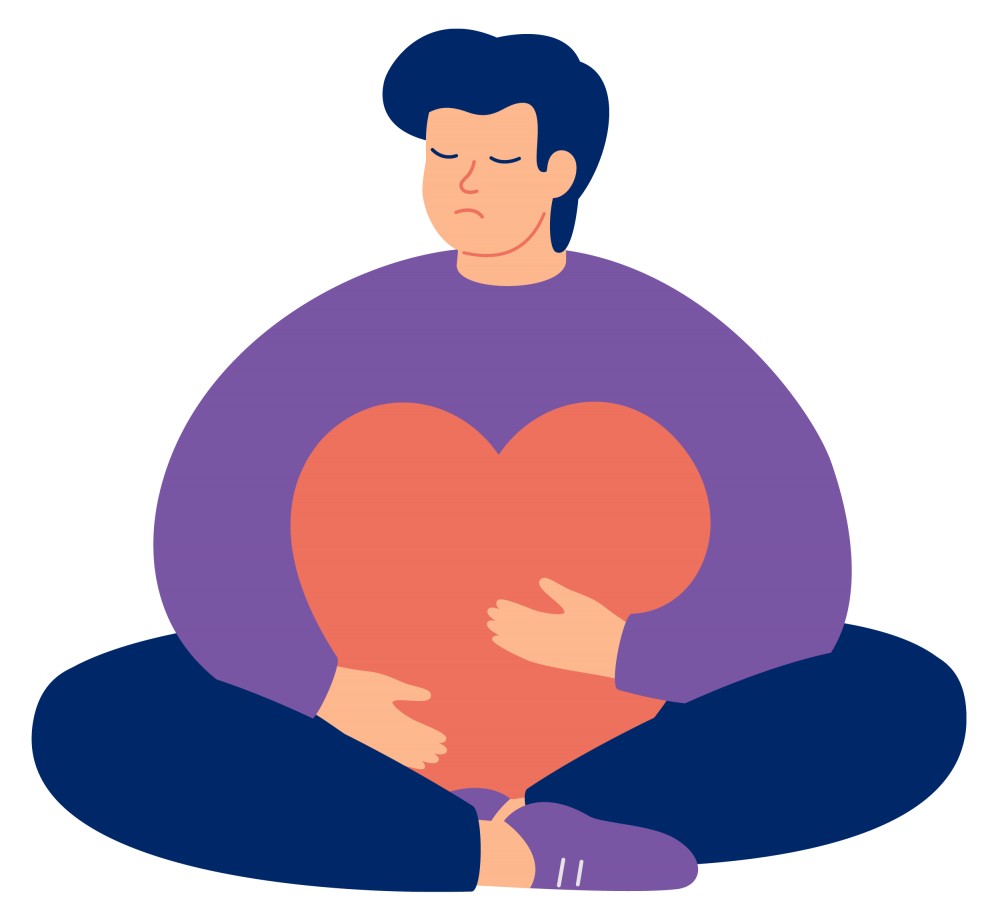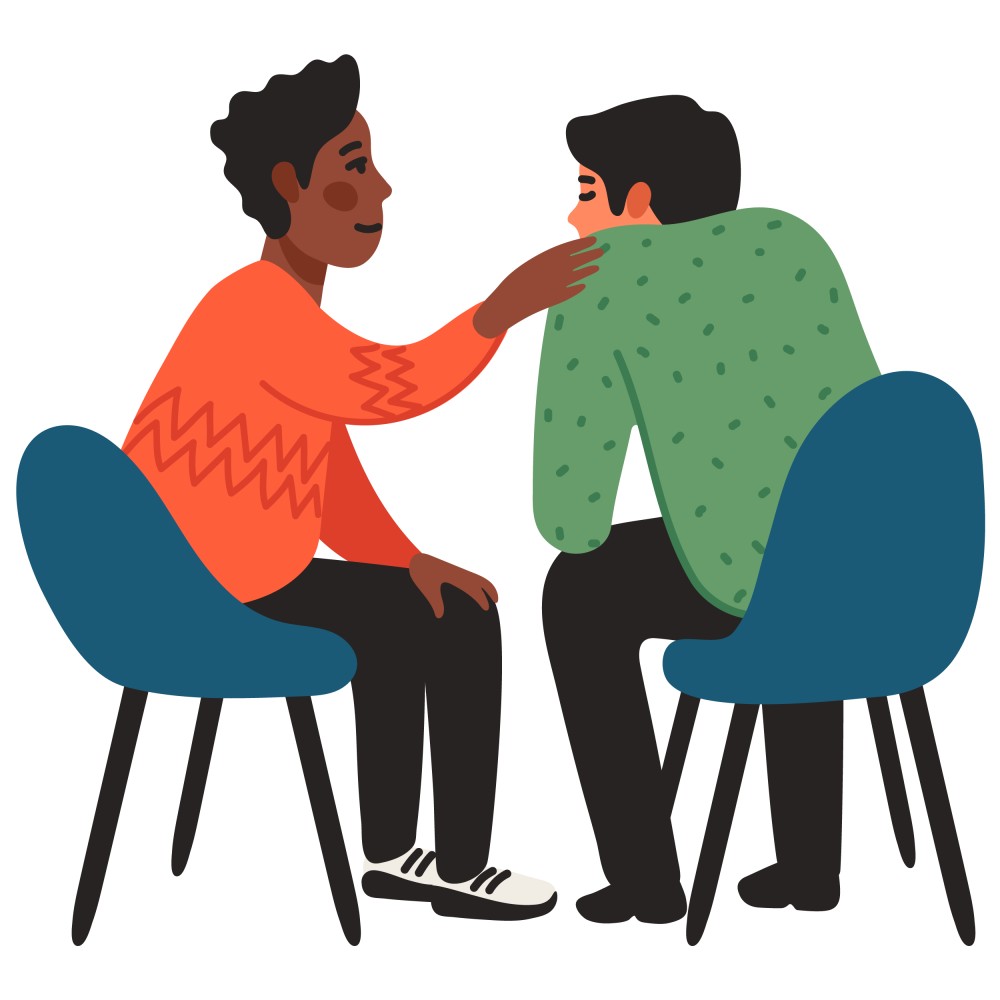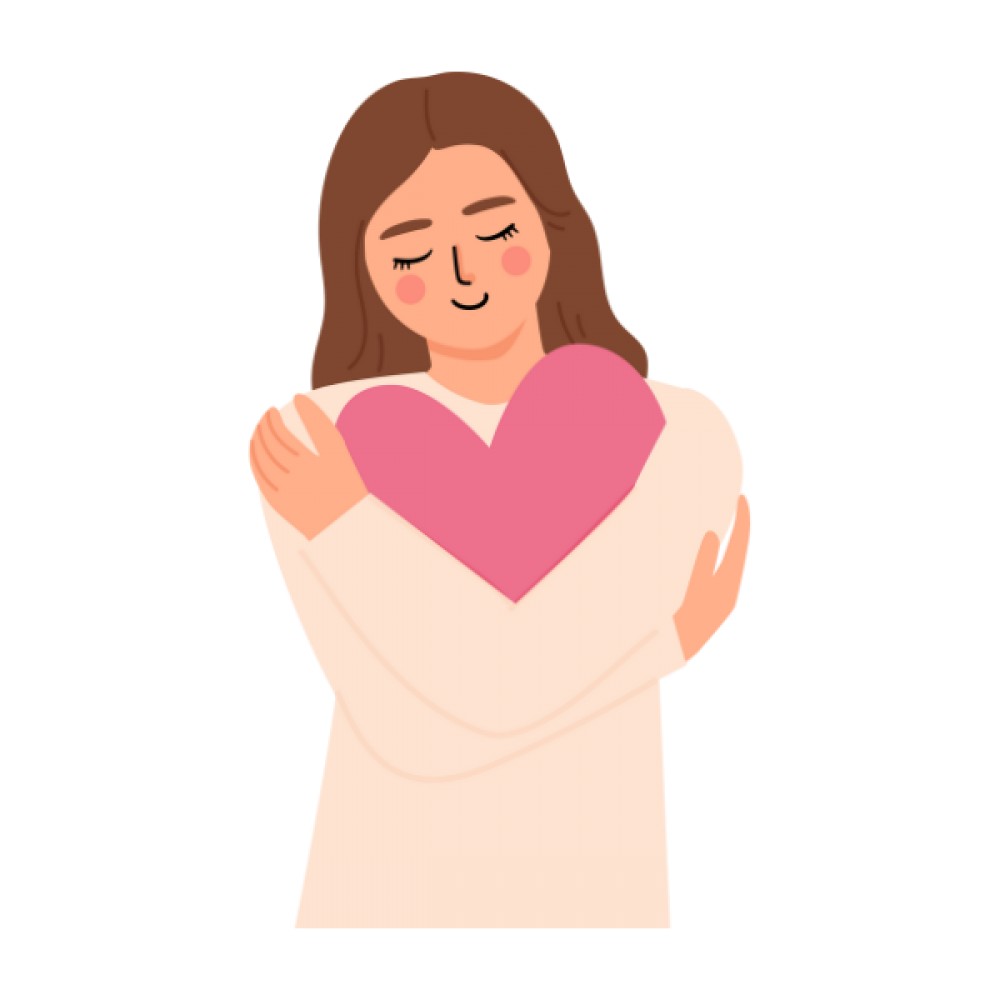Supporting others
Share:
Supporting someone experiencing mental distress and/or illness
When someone you know is experiencing mental distress or illness, it’s okay to connect with them to offer aroha and support. The person may tell you directly how they are feeling, or you may see, feel or sense that something isn't quite right with them or that their behaviour has changed.
You don’t need any special training to support someone – you just need to be able to listen to them. You can reassure the person that they’re not alone, that you care about them, and that support is available (and you can help them to access that support).

Taking care of yourself
When you spend time caring for someone else it’s important to take care of yourself too. Supporting someone through mental distress or illness can be challenging. You will need to look after your own wellbeing to make sure you have the energy, time and perspective to be there for them. See our information below for self-care tips.
How to offer support

It can feel scary or intimidating to offer support to someone you care about when they are experiencing mental distress or illness. You might feel worried you’ll say or do the wrong thing, but showing care and empathy can make a real difference. Often, the most important thing you can do is simply be there for them.
Give the person your time, and be present without judgement.
| If you think someone may be suicidal, ask them. It could save their life. Talking about suicide will not put the thought in their head. Visit our 'Suicide: worried about someone?' page for more information and support. |
Keep in mind
There may be times when the person you’re supporting might not want to talk with you. Try not to take this personally. They may feel more comfortable talking with someone who is not close to them (e.g. a counsellor or a GP).
Likewise, you may not be in the right space at this time to offer support, and that’s okay. Ask if there’s someone else (e.g. another whānau member or friend) the person could talk with, or if you can help connect them with an organisation or person they trust (e.g. a faith leader, counsellor or kaumatua). See our Help section for further information.
Sometimes people in distress may not want to discuss what's going on with anyone else or seek support. While difficult to accept, this is their current choice.They may change their mind at some point. If you're worried for them and it's impacting your wellbeing, please get support for yourself.
“My whānau were always there for me. Always ready to hear about the strange things happening in my mind. What was going on scared me. But to have the rock of my family helped me through. I didn’t understand all the unusual thoughts and perceptions that were playing out in my mind but to have a solid foundation beneath me, helped me to pull through.” – Individual with lived experience of schizophrenia
Supporting someone who is ready to seek professional help
There are lots of practical things you can do to support someone when they’re ready to seek help from a healthcare professional. For example, you could:
- Help them find evidence-based information from reputable sources about what support may work best for them. Visit our ‘Accessing mental health services’ page for more information.
- Support them to write a list of questions to ask their healthcare professional.
- Help with writing notes that can be shared with a healthcare professional, including details about what the person’s experiencing or feeling and past experiences. Help them organise any relevant paperwork, including prescription information or medical records.
- Ask if they’d like you to go to appointments with them. You could take notes or be there for support.
- Offer to help with day-to-day tasks, like organising childcare, doing the grocery shopping or helping with housework.
- If the person’s received a mental illness diagnosis, try learning about what they’re experiencing, treatment options and how you can support them through it. Visit our ‘A – Z Guide of mental health conditions’ section to learn more. For ways to be more inclusive towards people experiencing mental distress, click here or visit the Nōku te Ao website.
“If you understand more about what someone with mental distress may be going through, then you’ll be more aware of the impact that your words and actions can have on others.” — Someone with experience of mental distress
Visit our FAQs page for answers to common questions about mental health, or how to access mental health services.
Are you concerned someone is self-harming?
"I found having the support of a family member helpful when going through services, as it’s not something I could have done alone in my youth. Services may have changed now, but when I was younger, they felt very overwhelming and intimidating.” — Someone with experience of self-harm
Self-harm or self-injury is the direct, deliberate act of hurting or injuring your body. Often, a person self-harms as they believe it will help them cope with intense, difficult emotions, overwhelming situations and life events. Someone self-harming does not necessarily want to die but is instead responding to emotional pain or attempting to communicate how they’re feeling to others.
If you have noticed scars, marks, or behaviours in someone that concern you (but you are not sure whether the person is self-harming) talk with them. Ask them if they would like to talk about what’s going on for them and be patient.
For more information about self-harm and guidance on how to support someone who is self-harming visit our ‘Self-harm’ page.
Supporting tamariki or rangatahi experiencing mental distress and/or illness
Caring for a tamariki/child or rangatahi/young person experiencing mental distress or illness can be tough for parents, caregivers and wider whānau. Many tamariki and rangatahi may experience mental distress or illness at some stage in their lives, and while some issues may resolve with time, others may need additional support.
You know your tamariki better than anyone. If you're worried about them, first ask yourself: ‘Has there been a significant change in their behaviour?’ If so, consider:
- Is this behaviour change caused by any specific events or changes in their life?
- Do the changes only happen in the one place – e.g. at home or at kura/school?
- Do you notice changes when they're with others or alone?
Signs that your child may be upset or worried about something can include:
- Significant changes in their behaviour
- Ongoing difficulty with sleeping
- Withdrawing from social situations
- Not wanting to do things they usually like
- Self-harm or neglecting themselves (e.g. poor hygiene).
The tips listed in the ‘How to offer support’ section above can also be used by parents or caregivers supporting tamariki and rangatahi.

Looking after yourself while supporting someone else
Supporting someone you care about with their mental distress and/or illness can be stressful – and sometimes even physically and emotionally demanding. You need to take care of yourself if you want to be there for someone else.
Here are some key strategies to help with self-care:
- Eat well and get enough sleep
- Do activities that you enjoy
- Set your own boundaries, and know your limits
- Be mindful about time spent on your phone
- Involve other people in supporting the person – you can’t (and shouldn’t) do everything yourself
- Share your thoughts and feelings with someone you trust
- Acknowledge and celebrate small wins or achievements
- Seek support – reach out to whānau, friends, support groups, free helplines, your GP or a counsellor.
You may be the only one supporting the person or you may have had to take on extra responsibilities that can cause you financial, mental or physical stress (e.g. picking up extra household tasks, childcare responsibilities or having to cover extra bills).

